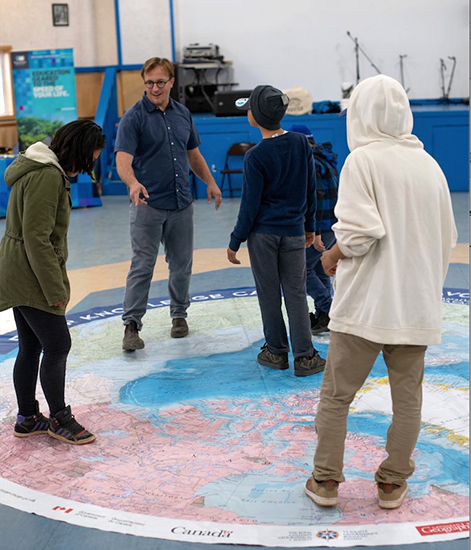Issue 13, Fall 2019
- Official opening of the Canadian High Arctic Research Station campus
- A successful 2019 field season for POLAR
- POLAR welcomes Japanese delegation at the CHARS campus
- NASA remote-sensing aircraft visits Cambridge Bay for field survey
- POLAR Antarctic activities
- POLAR’s Cambridge Bay speaker series features scuba-diving marine scientists
- University of Guelph field course at the CHARS campus
- Tuktoyaktuk Science Day: dialogue, learning and co-development
POLAR UPdate, Fall 2019
Official opening of the Canadian High Arctic Research Station campus
The Canadian High Arctic Research Station (CHARS) campus in Cambridge Bay, Nunavut, opened officially on August 21, 2019, in a ceremony attended by about 300 dignitaries and local residents. The lively ceremony featured drum-dancers, throat singers, and square dancers from Cambridge Bay and celebrations continued the next day with community activities including tours of the campus, science demonstrations, scientific and cultural displays, and much more. The opening marked a major milestone for the CHARS campus, which POLAR has been phasing into operation over the past several years.
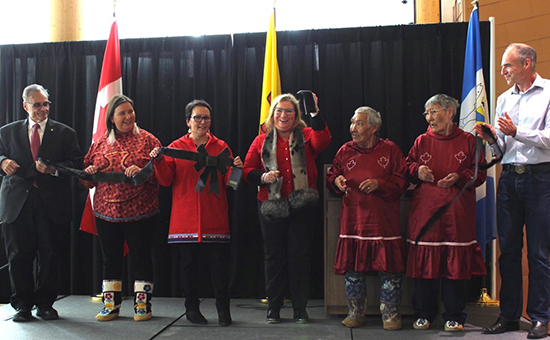
A successful 2019 field season for POLAR
POLAR’s field season for 2019 has wound down, after more than 2500 research support days at the CHARS campus and over 300 individual field trips since the beginning of April. POLAR’s own scientists as well as researchers from across Canada and other countries—the UK, Korea, Denmark, New Zealand, the US, and others—used the CHARS campus as a base to work on a total of 42 projects on topics including arctic char migration, the migratory and breeding ecology of birds, monitoring of arctic lichens and moss, permafrost monitoring, research on the spread of wildlife disease, and much more. In many cases researchers worked closely with members of the Cambridge Bay community, and a number of projects incorporated Indigenous knowledge.

POLAR welcomes Japanese delegation at the CHARS campus
In July, POLAR hosted a delegation from Japan led by Japan’s National Institute of Polar Research at the CHARS campus for a two-day workshop to enhance bilateral science cooperation in Canada’s central Arctic. The Japanese researchers shared information about their research expertise with POLAR’s researchers and the community of Cambridge Bay. POLAR shared information regarding projects underway in the Canadian Arctic and provided resources that describe the Canadian research context. POLAR looks forward to advancing project-specific collaboration with Japanese researchers through its work with the Canada-Japan Joint Committee on Science and Technology.
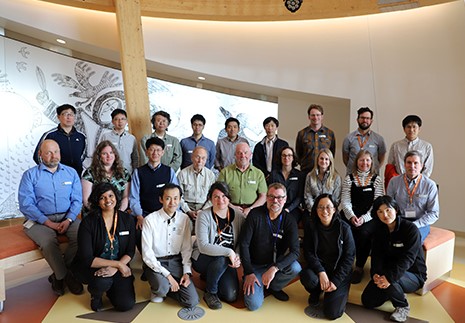
NASA remote-sensing aircraft visits Cambridge Bay for field survey
In August a NASA remote-sensing aircraft visited Cambridge Bay to do a field survey for the 10-year NASA Arctic-Boreal Vulnerability Experiment (ABoVE), an international project in which POLAR is one of many collaborators. ABoVE uses data collected from cutting-edge airborne instrumentation and satellites, such as Canada’s RADARSAT-2, alongside the expertise of Indigenous communities and scientists in the field, to build understanding of how the environment in Alaska and the Northwestern Canadian Arctic is changing. POLAR is the Canadian point of contact with NASA for ABoVE, and is funding related Canadian projects.
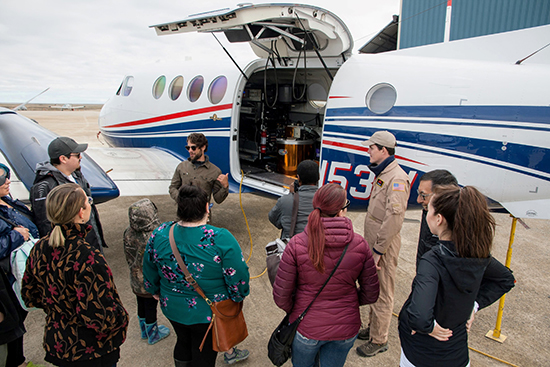
POLAR Antarctic activities
Over the summer, Polar Knowledge Canada participated in several activities related to its Antarctic mandate. In May, POLAR convened a meeting of the Canadian Committee on Antarctic Research (CCAR), POLAR’s Antarctic advisory body and Canada’s National Committee under the Scientific Committee on Antarctic Research (SCAR). POLAR provided CCAR members with Antarctic updates and discussed potential future directions for POLAR’s Antarctic-related activities.
POLAR ecologist Ian Hogg was invited to take part in a June workshop held by SCAR in Coimbra, Portugal, to identify the key Antarctic research findings of the past ten years. In July, POLAR attended the Antarctic Treaty Consultative Meeting in Prague, Czech Republic, as part of the Canadian delegation, holding discussions with international partners and participating in working groups on outreach and science research. POLAR then attended the Annual General Meeting of the Council of Managers of National Antarctic Programs (COMNAP) in Plovdiv, Bulgaria, where its status as an Observer to COMNAP was extended. Based on engagements at these venues, POLAR continues to work with key international partners to discuss future collaboration opportunities in polar science.
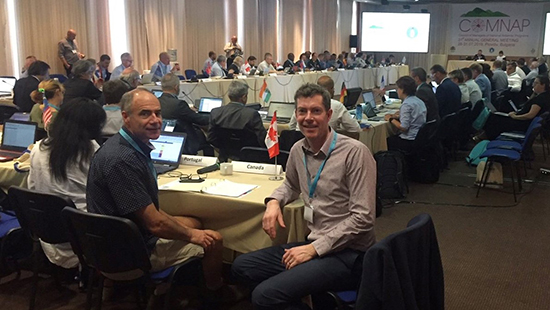
POLAR’s Cambridge Bay speaker series features scuba-diving marine scientists
In late August, as part of our regular speaker series at the Canadian High Arctic Research Station (CHARS) campus, POLAR teamed up with the Ocean Wise Conservation Association, which runs Vancouver Aquarium, to give Cambridge Bay residents a view of Arctic marine life from the perspective of scuba-diving marine scientists. Ocean Wise staff displayed live sea stars and other marine animals and offered visitors a close-up view of scientific diving equipment. This drew over 250 visitors, including 150 students from Kullik Ilihakvik elementary school. Neha-Acharya Patel, an early-career marine researcher and Canada’s first recipient of the prestigious Rolex scholarship, gave a talk on her experiences diving in the Arctic Ocean compared to other marine regions of the world. She was joined by Jeremy Heywood, a scientific diver with from Ocean Wise, who spoke on the marine biology of the Kitikmeot region.

University of Guelph field course at the CHARS campus
In late August, three Inuit employees of POLAR and five university students from southern Canada participated in an arctic ecology field course offered by the University of Guelph at the CHARS campus. Led by University of Guelph professors Shoshanah Jacobs (Department of Integrative Biology) and Tad McIlwraith (Department of Sociology and Anthropology) with input from POLAR scientists Ian Hogg, Johann Wagner, and Matilde Tomaselli, the course examined field methods for assessing arctic marine, terrestrial and freshwater ecosystems. The course highlighted two complementary approaches for understanding rapid ecosystem change: the university-based scientific approach, and the land-based experiential learning that Inuit have always used. As part of the course, Inuit elders Mabel and George Angohiatok welcomed students into their home for several visits.
Tuktoyaktuk Science Day: dialogue, learning and co-development
In August, POLAR took part in a science day hosted by the Hamlet of Tuktoyaktuk, Northwest Territories. Two hundred participants — community members, scientists, and representatives from federal and territorial governments and post-secondary institutions — gathered in the Inuvialuit community to learn and share information about research in the Western Arctic. Discussion topics included ways to improve support for science in Inuvialuit communities, how communities can benefit from science through co-design, co-development and direct participation, community challenges in the coming decades, and new ways to build community science capacity and opportunities. POLAR staff met with community members and colleagues, and shared information about our activities in the Western Arctic. The Tuktoyaktuk science day was funded, in part, through a PromoScience grant from the Natural Sciences and Engineering Research Council of Canada.
